Did you know that as you age, your body loses heat faster? Not only do you get colder more quickly, but certain conditions like diabetic neuropathy and memory loss can make it harder to know if you’re feeling cold.
Other illnesses or medication that makes it hard for seniors’ bodies to warm up include arthritis, thyroid issues, and Parkinson’s disease. Some medicines, including over-the-counter medications like cold medicine, can also affect your body’s ability to sense the cold.
While it would be nice if you could hibernate in the winter like a grizzly, you have to bear winter’s brunt at some point. The good news is that with a few winter weather safety tips, you can stay warm, stave off serious cold-weather health issues like hypothermia, and enjoy winter more.
Keep your house warm
It costs more to heat your home during the winter, and every penny counts if you’re on a fixed income or tight budget.
Some seniors attempt to save money by bundling up and turning their thermostats between 60°F and 65°F. Yet, this temperature isn’t enough to warm your body, even if you wear multiple layers to stay warm. In fact, many older adults living alone suffer from hypothermia because their homes are too cold.
Hypothermia is when the body’s temperature falls below 95°F. When the body’s temperature reaches this point, the possibility of health issues such as liver damage, kidney issues, and cardiac problems increases.
If you live alone, turn up your thermostat. According to the National Institute on Aging, the ideal indoor temperature is at least 68–70°F. In addition to turning up the thermostat, you can also do the following to prevent hypothermia:
- Eat healthy, filling meals to keep you warmed from the inside out
- Wear non-slip socks and slippers to keep your feet warm
- Place rolled towels in front of drafty doors
- Replace your furnace’s air filter to ensure sufficient airflow and heat
Some older adults swear by space heaters to keep them warm. While modern space heaters use energy effectively, they’re also safety hazards if misused. If you want to use a space heater in your home, keep it away from curtains, couches, and other fabrics. Also, purchase a space heater that turns off automatically if it’s knocked over.
Get outside—but bundle up!
Going outside in the winter is one of the fastest ways to boost your mood and fight off symptoms of Seasonal Affective Disorder (SAD). Humans need direct exposure to sunlight to get appropriate amounts of vitamin D. According to studies, just a few minutes a day has been proven to improve both our moods and our physical health, leading to reduced stress and increased self-esteem.
Yet, going outside on cold and windy winter days doesn’t always sound pleasant. After all, heavy winds can tax the body, and walking can be treacherous if there’s snow or ice on the ground. Still, with some preparation, rain, sleet, and snow don’t have to stop you from getting your daily dose of fresh air.
To enjoy outside during the winter, here’s what you need to do:
- Dress appropriately and wear loose layers to ensure airflow and prevent sweaty fabrics from clinging to your body
- Wear a hat, a scarf, and gloves because your extremities are the first to show signs of frostbite
- Wear appropriate footwear such as sneakers or snow boots if it’s snowy
- Walk on the grass when it’s icy to avoid slipping and falling
As winter gets underway, you want to take as many precautions as necessary to stay safe in your home and when you’re out. Preventing hypothermia and accidental falls must be your number one priority. If you notice your hands and feet begin to swell, you’re feeling sleepy, slurring your words, or experiencing confusion, these are signs of hypothermia. Move to a warmer place immediately, consume a warm drink, and wrap your body in blankets to warm up faster.
As a Life Plan Community, Monroe Village offers access to progressive levels of care, as and when you may need them—assisted living, rehabilitation therapies, memory care, and long-term skilled nursing care. Find out more about our health services.



